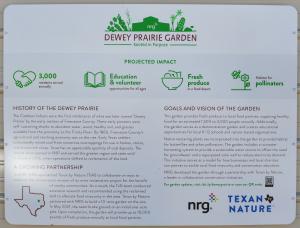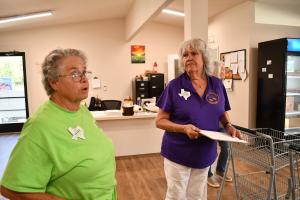It Takes A Village

With a little help from NRCS, a partnership between NRG Energy and Texan by Nature is providing fresh food to a tri-county food desert in East Texas.
Story and photos by: Adele Swearingen, Public Affairs Specialist, Bryan, TX
It Takes A Village ArcGIS StoryMap
Food deserts are areas where a substantial proportion of the population doesn’t have access to supermarkets or large grocery stores, or where there is limited access to a variety of healthy and affordable food. While many assume food deserts exist mainly in urban areas, that is not always the case. Freestone, Leon and Limestone Counties in East Texas are considered food deserts, with many residents living more than 10 miles from the nearest grocery store. Statistics from Feeding America show there are 3.7 million Texans suffering from food insecurity. Although some residents in the tri-county area receive Supplemental Nutrition Assistance Program (SNAP) benefits, those benefits do not stretch far enough to cover the needs for an entire month due to rapidly rising food costs. Gaining access to additional food is a problem, and access to fresh, healthy food is an even bigger problem because of the lack of grocery stores in the area.
Thanks to a partnership between NRG Energy and Texan by Nature (TxN), with a little help from the USDA Natural Resources Conservation Service (NRCS), that is changing.
In 2019, NRG Energy, the leading power company in the United States, headquartered in Houston, Texas, contacted Joni Carswell, CEO and President at Texan by Nature (TxN) hoping to collaborate on a conservation project on a 10-acre tract of land that was formerly part of a lignite mining site. According to Mike Altavilla, the senior project manager at the NRG Jewett Mine, NRG is a steward of the land, so when mining is completed, the company looks for ways to return the land to a condition better than it was prior to the mining.

TxN began researching ideas for appropriate conservation projects in the area. After learning about the food insecurity in the counties surrounding the reclaimed mine site, Carswell approached NRG with the idea of a “service garden.” A service garden provides what is harvested to local organizations, rather than directly to individuals like a community garden.
Along with the 10 acres, NRG donated repurposed materials such as PVC and tanks. TxN got to work initially preparing one acre of land to begin what is now known as the “NRG Dewey Prairie Garden.” With financial assistance from NRCS through the Texas Urban and Rural Conservation Project (TURCP) grant program, TxN was able to leverage funds to install pollinator habitat, raised beds and a rainwater harvesting system at the garden.
The TURCP was created in an effort to challenge community organizations, educational institutions and Indian tribes to focus on local grassroots conservation efforts that allows hunger to be addressed in food deserts.
Through the garden’s partnership with NRCS and the funds provided through TURCP, TxN was able to integrate conservation practices into the operation of the garden from the start.
Due to the decline in bees, butterflies and other pollinating insects, planting pollinator habitat is a valuable conservation practice used across Texas to help increase pollinator populations. Native Texas plant species that attract pollinators include Maximilian sunflower, milkweed, Indian blanket and bee balm.

Raised beds were installed where soil conditions are degraded to increase plant health and productivity. The garden manager, Debbie Glaze, a certified master gardener, has been very successful using the raised beds to grow a variety of vegetables including tomatoes, bell peppers and jalapenos.
The rainwater harvesting system that was installed at the garden keeps energy costs down by capturing rainfall and directing it through pipes to a storage tank. The water captured can be used to irrigate crops which reduces the demand on the existing water supply and reduces run-off and erosion at the garden.
“This year alone, 1,000 pounds of fresh produce has been harvested from this one-acre garden and shared with five local food pantries in the three-county area,” Glaze said. It is estimated that between 1,500 and 3,000 Texans will benefit from healthy food from this garden each year.
For food pantry customers, fresh produce is a luxury item. “When our clients come each month and see fresh produce that they normally do not have access to, they leave with a huge smile,” said Novalene Thurston with the Oakwood Community Food Pantry. “There are no big box stores in the county, so opportunities to get fresh produce are very limited.”

Peggy Wright with The Lord’s Pantry agrees. “Our clients are so appreciative to be able to supplement their monthly food box with the healthy produce from the NRG Dewey Prairie Garden. To have this produce to give means the world to us as well.”
“Grateful” is the best word to describe how clients of the food pantries feel about receiving fresh produce each month. So grateful, in fact, that several clients give back by volunteering at the garden and/or the local food pantry.
“Working in partnership with Texan by Nature, NRG Energy is able to positively impact community members in the tri-county area from a small parcel of land,” said Altavilla.
Jay Knight, an urban conservationist with NRCS agrees. “It’s easy to see the impact a farmer is making when growing hundreds or even thousands of acres of crops such as rice, soybeans, and corn, but to see the impact of a small one-acre garden on the immediate community is astonishing.”
It truly takes a village these days. When communities benefit from partnerships like the one at NRG Dewey Prairie Garden… everybody wins!

